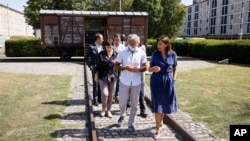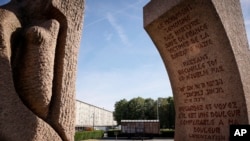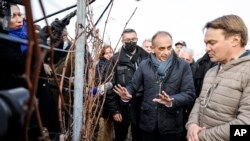Family by family, house by house, French police rounded up 13,000 people on two terrifying days in July 1942, dispatching them to Nazi death camps simply because they were Jewish. Eighty years later, France is honoring the victims, and trying to keep their memory alive.
For the dwindling number of survivors of France’s wartime crimes, commemoration ceremonies Sunday are especially important. At a time of rising antisemitism and far-right discourse sugarcoating France’s role in the Holocaust, they worry that history’s lessons are being forgotten.
A week of ceremonies marking 80 years since the Vel d’Hiv police roundup on July 16-17, 1942, culminates Sunday with an event led by President Emmanuel Macron.
The raids were among the most shameful acts undertaken by France during World War II, and among the darkest moments in its history.
Over those two days, police herded 13,152 people — including 4,115 children — into the Winter Velodrome of Paris, known as the Vel d’Hiv, before they were sent on to Nazi camps. It was the biggest such roundup in western Europe. The children were separated from their families; very few survived.
In public testimonies over the past week, survivor Rachel Jedinak described a middle-of-the-night knock on the door and being marched through the streets of Paris and herded into the velodrome, in the shadow of the Eiffel Tower.
She recalled her desperate mother shouting at police. Some neighbors informed on Jews; others wept as they watched them corralled like livestock.
Chantal Blaszka’s aunts and uncle were among the children rounded up: 6-year-old Simon, 9-year-old Berthe, 15-year-old Suzanne. Their names are now engraved on a monument in a garden where the velodrome once stood, along with some 4,000 other children targeted in the raids. Photos of the children hang from tree trunks, the result of years of painstaking research to identify and honor the long-anonymous victims.
Of the children deported from the Vel d’Hiv 80 years ago, only six survived.
“Can you imagine?” Blaszka asked, pointing at the names and shaking her head. “Can you imagine?”
Serge Klarsfeld, a renowned Nazi hunter whose father was deported to Auschwitz, spoke Saturday in the garden, calling it an “earth-shaking testimony to the horrors lived by Jewish families.”
He stressed the urgency of passing on living memory. “The youngest of us are in our 80s,” he said of the children of deportees.
The father of Micheline Tinader was among the 76,000 Jews deported from France under the collaborationist Vichy government. As a child, Tinader herself had to hide from Nazis.
She took part in a commemoration ceremony this week at the Shoah Memorial in the Paris suburb of Drancy and is part of an association based at the site that organizes educational trips to Auschwitz.
Drancy held a transit center that was central to French Jews’ deadly journey to Nazi camps. Some 63,000 people were held over the course of the war.
The Drancy Shoah memorial actively documents the Holocaust, especially for younger generations. This work is especially important at a time when Jewish communities are increasingly worried about rising antisemitism in Europe. France’s Interior Ministry has reported a rise in antisemitic acts in France over recent years and said that while racist and anti-religious acts overall are increasing, Jews are disproportionately targeted.
Anxiety has worsened for some since the far-right National Rally party made a surprising electoral breakthrough last month, winning a record 89 seats in France’s National Assembly.
Party co-founder Jean-Marie Le Pen has been convicted of racism and downplaying the Holocaust. His daughter Marine, who now leads the party, has distanced herself from her father’s positions, but the party’s past still raises concerns for many Jews.
During the campaign for this year’s French presidential election, far-right candidate and pundit Eric Zemmour propagated the false claim that Adolf Hitler’s Vichy collaborators safeguarded France’s Jews.
It took France’s leadership 50 years after World War II to officially acknowledge the state’s involvement in the Holocaust, when then-President Jacques Chirac apologized for the French authorities’ role in the Vel d’Hiv raids.
On Sunday, Macron is visiting a site in Pithiviers south of Paris where police sent families after the Vel d’Hiv roundup, before sending them on to camps.
“The policy, from 1942 onward, was to organize the murder of the Jews of Europe and therefore to organize the deportation of the Jews of France,” said Jacques Fredj, director of the Paris Shoah Memorial.
“Most of the time, the decisions were made by the Nazis and implemented by the French administration,” he said. “But the management was French. [French] Gendarmes or policemen were managing and supervising.”



